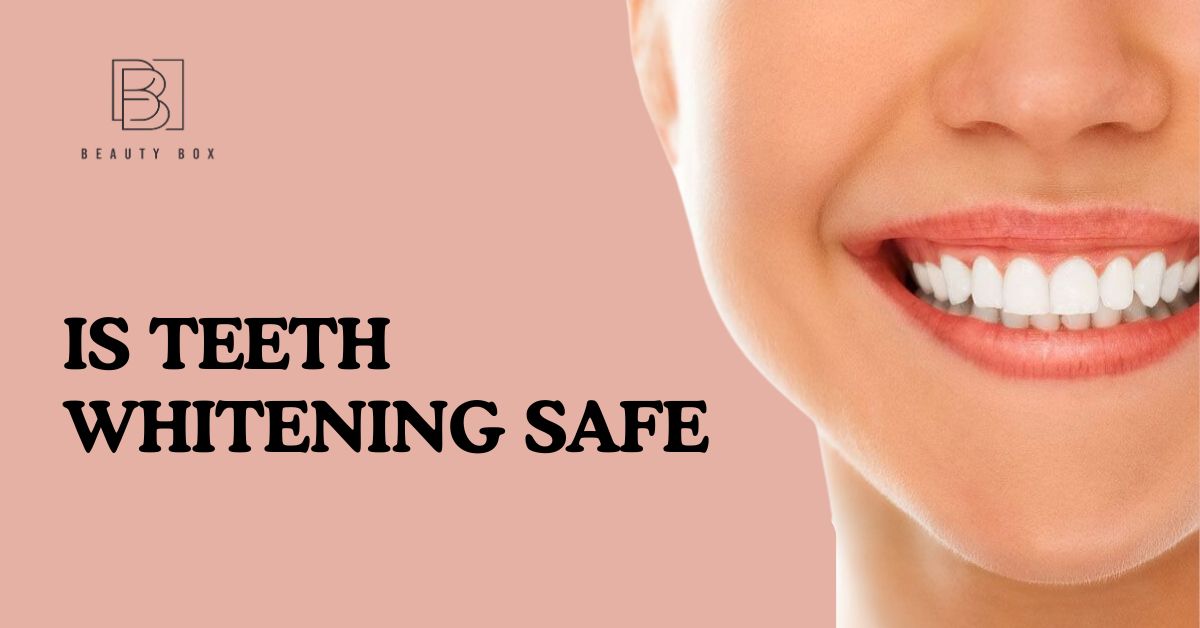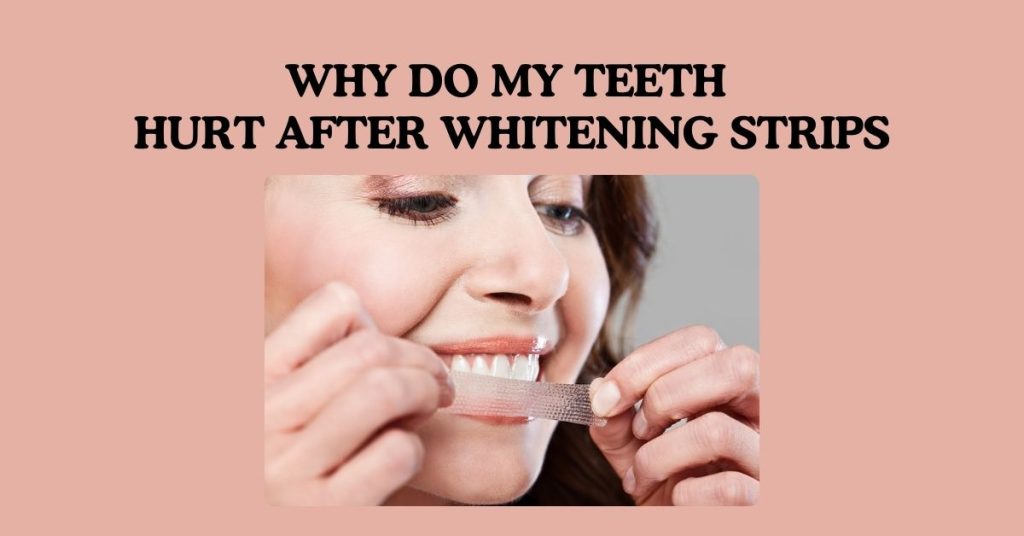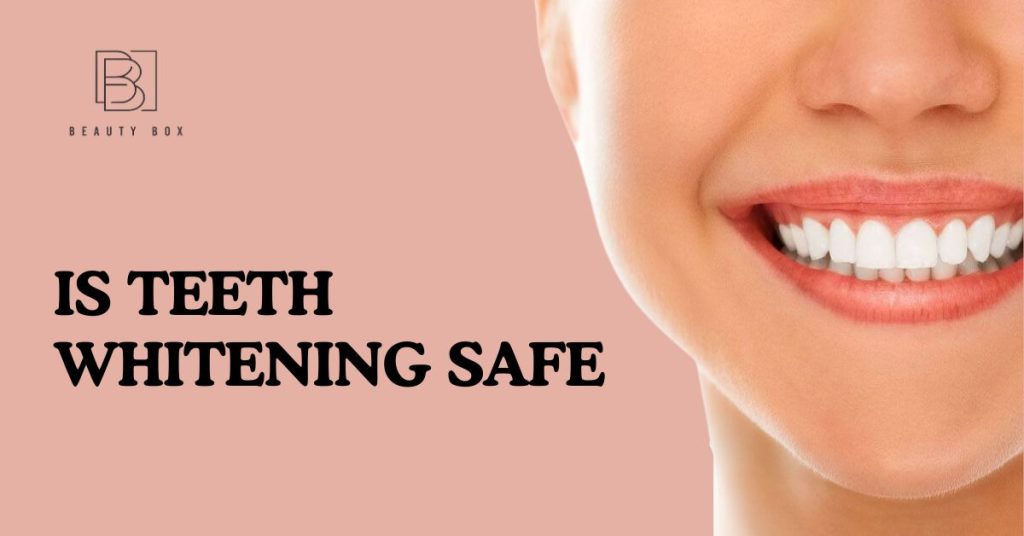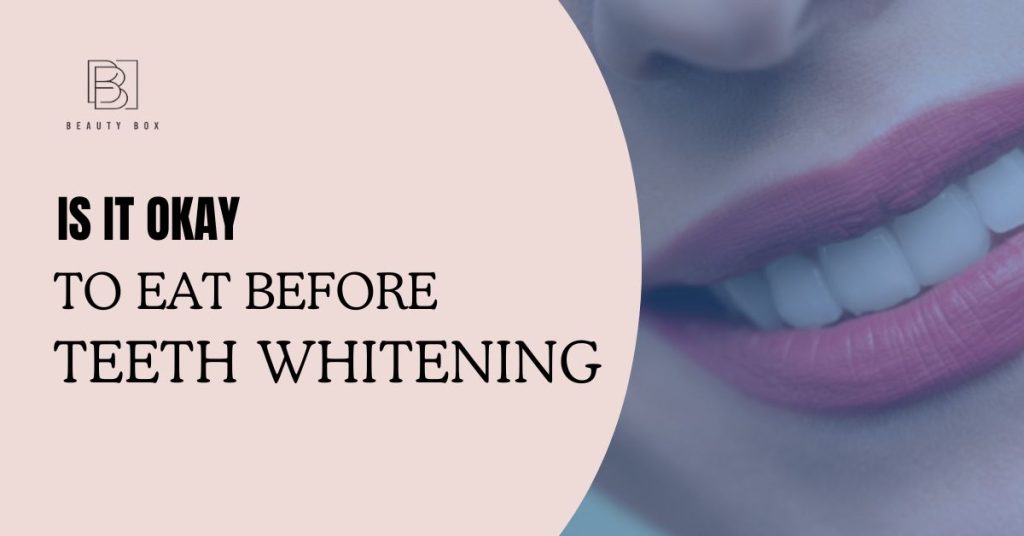Is Teeth Whitening Safe? Teeth whitening is a popular way to brighten your smile, but you may wonder if it’s really safe. The good news is that teeth whitening is generally safe when done the right way. In fact, over 80% of people who try teeth whitening are happy with the results. Most common methods use safe ingredients like hydrogen peroxide or carbamide peroxide, which help remove stains without causing damage when used correctly.
However, about 50% of people experience mild tooth sensitivity or gum irritation after whitening. These effects are usually temporary and go away after a few days. Professional teeth whitening is often safer than at-home methods, as experts can control the process more carefully.
At Beauty Box, we offer safe and effective teeth whitening treatments that deliver long-lasting results. Our licensed estheticians provide personalized care, making sure your teeth stay healthy while achieving a brighter smile.
In this page, we’ll learn that teeth whitening can be safe and effective when done with the right care and professional guidance.
What Is Teeth Whitening?
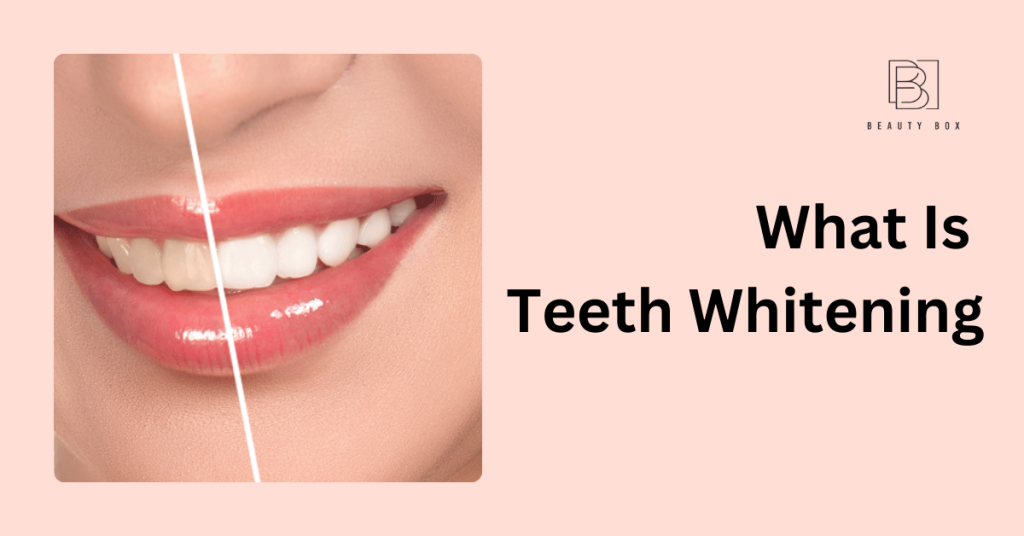
Teeth whitening is a cosmetic treatment designed to make your teeth brighter and whiter. Over time, your teeth can become stained or discolored due to food, drinks, or habits like smoking. Teeth whitening helps remove these stains, leaving you with a more confident, radiant smile.
The basic process of teeth whitening uses chemicals like hydrogen peroxide or carbamide peroxide. These chemicals break down stains on your teeth and lighten their color. The whitening agents release oxygen, which penetrates the enamel to remove the stains.
There are two main types of teeth whitening treatments:
At-home treatments, like whitening toothpaste, strips, or gels, are more affordable and easy to use. However, they are typically less concentrated and take longer to show results. For example, whitening strips can take about 1-2 weeks to show noticeable improvement. On average, at-home whitening products can improve your smile by 50% in about two weeks, though they may not work as well on stubborn stains.
Licensed estheticians or dentists do professional whitening treatments. These treatments use stronger whitening agents and often give faster, more noticeable results. 97% of people who undergo professional whitening see significant improvement after just one session. Professional treatments can make your teeth up to 8 shades lighter in a single visit. They typically use 35-40% hydrogen peroxide, which is much stronger than at-home treatments, which generally use 3-10%.
Both at-home and professional treatments use hydrogen peroxide or carbamide peroxide, but professional treatments offer quicker, more effective results, especially for more stubborn stains.
Is Teeth Whitening Safe? Debunking Common Myths
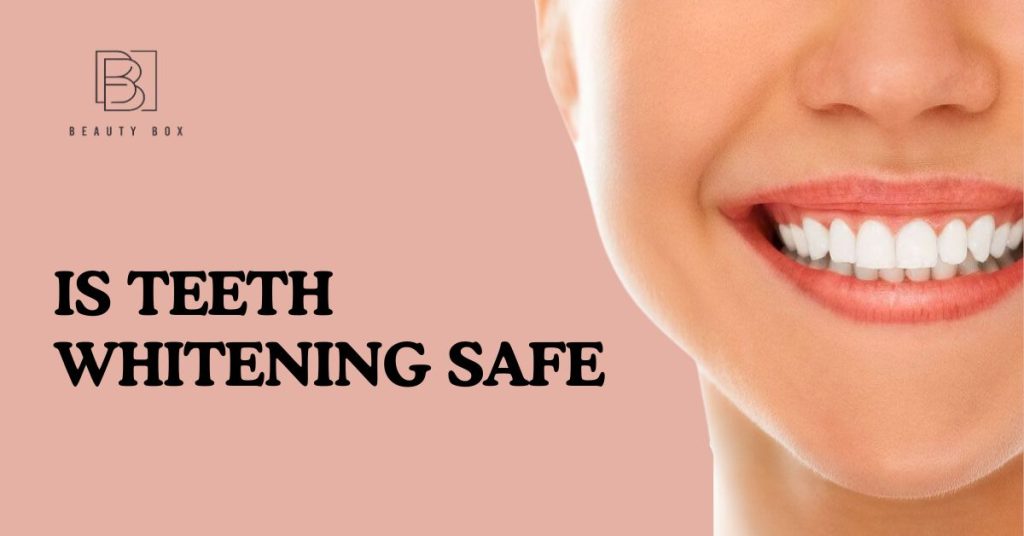
Teeth whitening has become a popular way to brighten smiles, but you might have some concerns. Is it safe? Let’s break down the most common myths about teeth whitening and clear up any confusion.
1: Teeth Whitening Damages Your Teeth
A lot of people worry that teeth whitening will damage their teeth, but that’s simply not true. Teeth whitening is generally safe when used correctly. In fact, 97% of people who use professional whitening treatments report no long-term damage to their teeth. The trick is to use the right products and follow the instructions carefully.
2: Teeth Whitening Causes Permanent Sensitivity
Many believe that teeth whitening will leave you with permanent sensitivity. However, sensitivity is usually temporary. Around 40% of people experience mild tooth sensitivity during or after whitening, but it fades away within a few days. If sensitivity bothers you, use toothpaste for sensitive teeth, which can help reduce discomfort.
3: All Whitening Products Are the Same
Not all whitening products are the same. Some over-the-counter products may be too harsh or ineffective. Dentists recommend professional whitening treatments because they use higher-quality products that are safer for your teeth. 88% of people who get professional whitening treatments are more satisfied with their results compared to using store-bought products.
Safety Concerns: Tooth Sensitivity and Gum Irritation
While whitening products are safe, some people may experience tooth sensitivity or gum irritation. These side effects are common but usually temporary. About 30% of people report feeling some gum irritation when the whitening gel touches the gums. The good news is that these issues usually go away quickly.
If you use teeth whitening products incorrectly or too often, you may cause damage. Excessive use of whitening products can weaken your enamel, and this can lead to long-term sensitivity. Always follow instructions, and if you’re unsure, consult a professional.
Using Whitening Products Correctly
To make sure whitening is safe for you:
- Choose high-quality whitening products, like those approved by your dentist or esthetician.
- Don’t overuse whitening products much can harm your teeth.
- Always consult a professional if you’re unsure about which product to use.
Teeth whitening can be safe and effective when used the right way. Don’t let myths hold you back from achieving a brighter smile. With proper care and the right products, you can enjoy a whiter smile without the risks! If you want professional whitening done safely, book an appointment with us at Beauty Box.
Benefits of Teeth Whitening
Teeth whitening can boost your confidence by giving you a brighter smile. When your teeth look whiter, you’ll feel more comfortable showing them off. A whiter smile can make a big difference in how you feel about yourself, whether it’s in a meeting or at a social event.
For those looking to improve their appearance, teeth whitening is a simple and effective way to do it. Over time, your teeth can get stained from drinks like coffee, tea, or wine. Whitening helps reverse these stains and can give you a fresh, youthful look.
Professional teeth whitening also gives long-lasting results. Studies show that professional treatments can last anywhere from 6 months to 2 years, depending on how well you care for your teeth. In comparison, over-the-counter whitening products usually offer results that last only a few weeks. This means you won’t have to keep spending money on products that don’t last as long.
Using professional whitening products means you’re getting stronger, more effective formulas that deliver noticeable results. According to the American Dental Association (ADA), professional whitening treatments can brighten teeth by 3 to 8 shades, depending on your initial tooth color. Over-the-counter products might only lighten teeth by 1 to 2 shades.
By choosing professional whitening, you’re getting safe, effective, and long-lasting results. It’s a smart way to invest in your smile and your confidence.
Risks and Side Effects of Teeth Whitening
Teeth whitening can give you a bright smile, but it’s important to know about the possible risks and side effects. Here’s what you need to watch out for:
- Sensitivity
After whitening, you may feel some temporary tooth sensitivity. This means your teeth might hurt or feel uncomfortable when you eat or drink something hot or cold. According to a study by the American Dental Association, 60% of people experience tooth sensitivity after whitening. But don’t worry-this usually goes away in a few hours or a couple of days. If the sensitivity lasts longer, it’s a good idea to check with your dentist or esthetician. - Gum Irritation
Sometimes, whitening products can irritate your gums, especially if the gel or treatment touches them. You might see redness, swelling, or feel some discomfort. In most cases, the irritation goes away within a few days. But to avoid this, it’s important to use whitening products carefully, especially at-home treatments. A survey by the British Dental Journal found that 30% of people who used at-home whitening products experienced gum irritation. - Enamel Damage
Overusing whitening treatments can weaken the enamel, which is the protective layer on your teeth. When the enamel is damaged, your teeth can become more prone to decay and staining. Studies show that frequent use of whitening products can reduce enamel hardness by up to 10%. To protect your enamel, always follow the instructions carefully and avoid overdoing it.
Why Quality Products and Professional Help Matter
To avoid these risks, always choose quality whitening products that are FDA-approved or dentist-recommended. A study by the Journal of the American Dental Association found that products with professional approval are 95% safer than non-professional alternatives.
Before starting any whitening treatment, it’s a smart idea to consult a professional. A licensed esthetician or dentist can help you choose the right treatment for your needs and ensure it’s done safely. This way, you can enjoy a brighter smile without worrying about side effects or damage.
Remember, your smile is important, but your dental health comes first! Always go for safe whitening options and professional guidance for the best results.
How to Safely Whiten Your Teeth:
When you want whiter teeth, you have two main options: professional treatments and DIY methods. Here’s how they compare:
- Professional Whitening:
- Pros: You get quick results, usually within an hour. It’s safe and long-lasting, and dentists use high-quality products that are tailored to your needs.
- Cons: It can be expensive. You’ll also need to take time off to visit the dentist or esthetician.
- DIY Methods:
- Pros: Affordable and convenient. You can whiten your teeth at home whenever it’s right for you.
- Cons: Results may vary, and overuse of these products can lead to tooth sensitivity or gum irritation. Some products may not be safe or effective.
| Method | Pros | Cons |
| Professional | Quick, safe, long-lasting | Expensive requires a visit |
| DIY | Affordable, convenient | Risk of sensitivity, less effective |
Do’s and Don’ts of Safe Teeth Whitening
To keep your teeth healthy and bright, here are the do’s and don’ts for safe teeth whitening:
- Do:
- Choose FDA-approved products that are dentist-recommended.
- Follow instructions carefully, especially for at-home whitening products.
- Consult a licensed esthetician or dentist to make sure whitening is right for you.
- Choose sensitivity-friendly products if you have sensitive teeth.
- Don’t:
- Over-whiten your teeth. Whitening too often can damage your teeth and cause discomfort.
- Use unverified whitening products.
- Skip aftercare. Use gentle toothpaste and avoid foods that stain your teeth.
Choosing the Right Products
It’s important to choose the right whitening products. Look for those that are FDA-approved and dentist-recommended. These products have been tested for safety and effectiveness. Consulting a licensed professional will ensure you’re using the safest and most effective options for your teeth.
How Often Should You Whiten Your Teeth?
It’s tempting to want whiter teeth as soon as possible, but whitening too much can be harmful. Generally, you should whiten your teeth every 6-12 months. For professional whitening, treatments are typically recommended every 6-12 months, but depending on your teeth, your dentist might suggest more or less frequent treatments. For DIY whitening, you may need to whiten less often, usually every 3-6 months, depending on the product you use. Overuse of at-home whitening treatments can cause damage to your teeth and gums.
Method, Frequency, and Risks of Overuse
| Method | Frequency | Risks of Overuse |
| Professional | Every 6-12 months | Tooth sensitivity, gum irritation |
| DIY | Every 3-6 months | Enamel damage, increased sensitivity |
Maintenance Tips for Keeping Teeth White
Once your teeth are whitened, it’s important to maintain the results. Brushing twice a day with whitening toothpaste will help keep your smile bright. Drinking water after meals can wash away food particles that could stain your teeth. It’s also helpful to avoid drinks like coffee, wine, and tea or use a straw to minimize contact with your teeth. Using a whitening mouthwash will further assist in maintaining your results and ensuring your smile stays sparkling.
Over-Whitening Risks
Over-whitening can lead to tooth sensitivity and gum irritation. If you whiten too frequently, your enamel could suffer from damage, making your teeth more vulnerable to staining. Studies show that 28% of people experience sensitive teeth after overusing whitening products, which can be painful and uncomfortable. To prevent this, it’s crucial to follow a safe whitening schedule. Consulting with a professional can help you determine the ideal frequency for whitening based on your specific needs.
Maintaining a safe whitening schedule and following proper aftercare is the best way to achieve and preserve a bright, healthy smile. Always consult a professional to ensure you’re whitening your teeth safely and effectively.
Final thoughts
When it comes to teeth whitening, safety should always be your top priority. By following the right guidelines and using FDA-approved or dentist-recommended products, you can achieve a brighter smile without compromising your dental health. Over-whitening can lead to discomfort and damage, so it’s essential to find a routine that works for you, whether through professional whitening or DIY methods.
If you’re looking for personalized advice or assistance in getting that radiant smile, it’s always a good idea to consult with a licensed esthetician or dentist. After all, maintaining a healthy and bright smile is part of the bigger picture when it comes to your overall well-being.
Are you ready to give your smile the care it deserves and make sure you’re whitening safely? Let us help you get started on your journey to a beautiful, confident smile!
